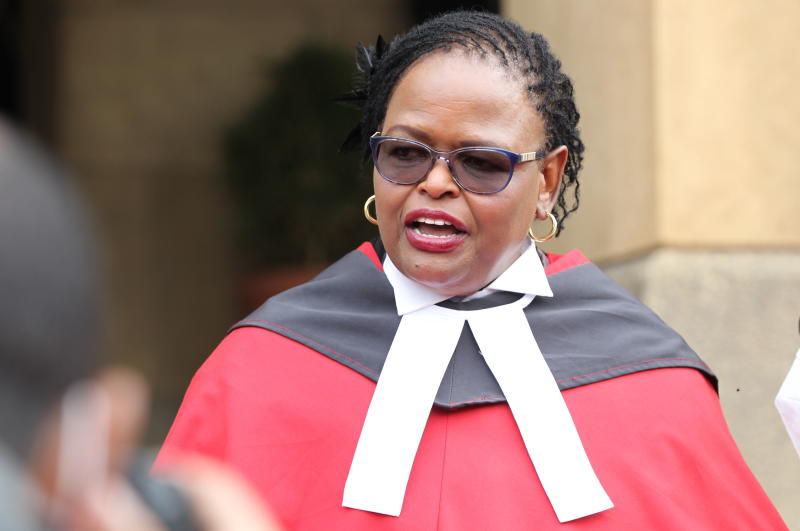Kenya’s wins and losses in FGM war as 2022 beckons
- Spotlight East Africa
- Feb 5, 2021
- 4 min read

PS Ministry of Public Service, Youth and Gender Affairs Safina Kwekwe (right) during the signing of an MOU with with Maasai elders from Loita in Kenya and Nkororngoro in Tanzania, to denounce circumcision of girls from the community in January, 2019. (Nation Media Group/George Sayagie)
President Uhuru Kenyatta launched the National Policy on Abandonment of Female Genital Mutilation (FGM) in November last year, kicking off a campaign to eradicate the vice in the country by 2022.
With slightly more than a year left to the 2022 deadline, what achievements have the national campaign made?
The government and other non-State actors have made major strides in trying to win the decades-long cultural practice.
Public Service and Gender Cabinet Secretary Prof Margaret Kobia in September last year pointed out the achievements made so far, in the battle to eradicate the vice.
Prof Kobia revealed that the government had revised the eradication of FGM Policy to align with current realities, developments and the Constitution of Kenya 2010.
She noted that the ministry has developed focused interventions to address FGM in key sectors such as health, education, security, access to justice and public information while emphasizing participation as human rights approach to empowering girls and women.
Community dialogues
The CS added that the ministry had developed nine programs of actions to help the government eradicate the vice by 2020. They include promoting education and community dialogues, enforcement of FGM laws, engaging boys and men, girls and women and entrenching FGM content in schools among others.
Other programs include strengthening capacity building, addressing cross-border FGM, addressing FGM in emergencies and humanitarian situation and women empowerment.
“County anti-FGM steering committees chaired by the County Commissioners that have been established will be responsible for providing county-specific strategic policy direction, mobilizing resources for FGM prevention and response, besides being an integral part of the inter-governmental county gender sector working group,” the CS said during a meeting with cultural, religious and the region’s administration leaders at the Kenya School of Government in Kabarnet, Baringo County.

Chairperson of Anti-FGM Board Agnes Pareyio, (centre) with Mr Haithar Ahmed Somo from Unicef Kenya (left) and Ms Bernadette Loloju, CEO Anti-FGM Board when they donated pads to girls in 12 FGM hot spot counties. The board is working with the Church to help in the anti-FGM campaign. (Nation Media Group)
The government and other anti-FGM crusaders have also led other initiatives to get elders and circumcisers support the 2022 campaign.
The initiative has started bearing fruit after elders in West Pokot and Marsabit counties denounced FGM, terming it retrogressive, and vowing to join hands with the government in the fight.
In August last year, Marakwet cultural leader Mr Chelang’a Cheptoo also registered his support for the anti-FGM campaign. In September the same year, Maasai Council of Elders in Narok, acknowledged that FGM was no longer a cultural rite as it had been overtaken by time and caused harm to women and girls.
Joined anti-FGM campaign
The Borana Council of Elders locally known as Guma Gayo also renounced the vice in October terming it illegal.
Public Service and Gender Chief Administrative Secretary (CAS) Rachel Shebesh has been leading the campaign to prevail upon circumcisers to abandon the practice. A number of circumcisers in Garissa, Tana River and Wajir counties have already joined the anti-FGM campaign.
During a meeting attended by Ms Shebesh recently, Ms Galina Gurre from Garissa, downed her circumcision tools of trade, handed them to the Gender ministry and pledged to be an anti-FGM crusader in her locality.
The government now uses the converted circumcisers as anti-FGM champions in their respective communities.
Speaking in Tana River County recently during an anti-FGM awareness tour, Ms Shebesh said the government would link the circumcisers to alternative sources of income.
“We have to talk to them to abandon the harmful practice. Ending FGM is very important to the wellbeing of girls and women not just because it’s the law; the scars left after the act are lifelong and women live with the trauma forever,” said Ms Shebesh.
Last month, the Anti-FGM Board revealed that it was now targeting the Church to help with the battle. The board chairperson Ms Agnes Pareiyo said the agency was collaborating with church leaders to launch and undertake anti-FGM campaign to the 22 FGM hotspot counties.
She said church leaders are crucial as they interact with all members of the society and are highly respected.
Ms Pareiyo, speaking recently during a meeting of religious leaders in Narok, said the religious leaders will be tasked with preaching on the dangers of circumcising girls.
Budgetary allocation
Despite the strides made so far, however, there remains a myriad of challenges including scarce budgetary allocation, lack of political will and medicalisation of FGM.
Ms Eva Komba the Gender and Advocacy lead at Sustainable Development Goals (SDG) Kenya Forum says the campaign can be realised if the resources were adequate.
She says there is need to sort out structural challenges at household and community levels to deal with issues like poverty, gender inequalities, climate change which are some of the key issues that push communities to cut girls.
“Girls help families survive during times of scarcity of food and other resources. During this Covid-19 period, we have seen an increase in cutting of girls and it is, therefore, time to address the societal economic issues that perpetuate FGM,” she says.
This article was published by Daily Nation.




Comments